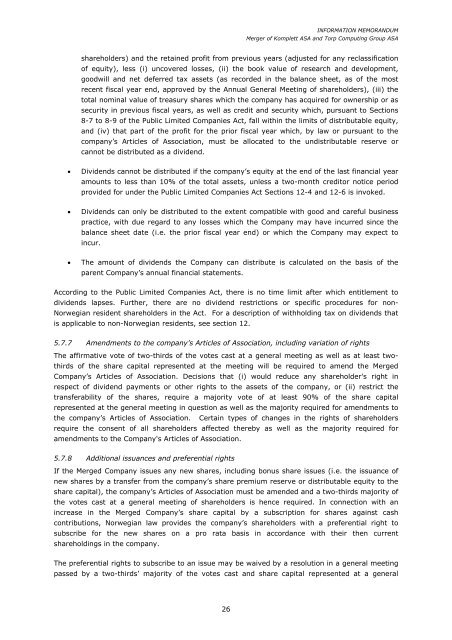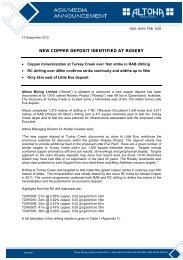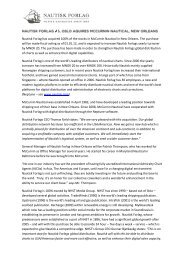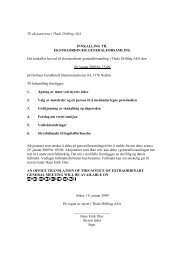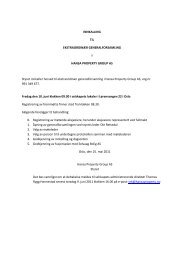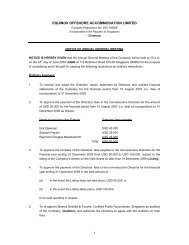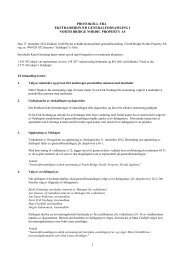Torp Computing Group ASA
Torp Computing Group ASA
Torp Computing Group ASA
Create successful ePaper yourself
Turn your PDF publications into a flip-book with our unique Google optimized e-Paper software.
26<br />
INFORMATION MEMORANDUM<br />
Merger of Komplett <strong>ASA</strong> and <strong>Torp</strong> <strong>Computing</strong> <strong>Group</strong> <strong>ASA</strong><br />
shareholders) and the retained profit from previous years (adjusted for any reclassification<br />
of equity), less (i) uncovered losses, (ii) the book value of research and development,<br />
goodwill and net deferred tax assets (as recorded in the balance sheet, as of the most<br />
recent fiscal year end, approved by the Annual General Meeting of shareholders), (iii) the<br />
total nominal value of treasury shares which the company has acquired for ownership or as<br />
security in previous fiscal years, as well as credit and security which, pursuant to Sections<br />
8-7 to 8-9 of the Public Limited Companies Act, fall within the limits of distributable equity,<br />
and (iv) that part of the profit for the prior fiscal year which, by law or pursuant to the<br />
company’s Articles of Association, must be allocated to the undistributable reserve or<br />
cannot be distributed as a dividend.<br />
• Dividends cannot be distributed if the company’s equity at the end of the last financial year<br />
amounts to less than 10% of the total assets, unless a two-month creditor notice period<br />
provided for under the Public Limited Companies Act Sections 12-4 and 12-6 is invoked.<br />
• Dividends can only be distributed to the extent compatible with good and careful business<br />
practice, with due regard to any losses which the Company may have incurred since the<br />
balance sheet date (i.e. the prior fiscal year end) or which the Company may expect to<br />
incur.<br />
• The amount of dividends the Company can distribute is calculated on the basis of the<br />
parent Company’s annual financial statements.<br />
According to the Public Limited Companies Act, there is no time limit after which entitlement to<br />
dividends lapses. Further, there are no dividend restrictions or specific procedures for non-<br />
Norwegian resident shareholders in the Act. For a description of withholding tax on dividends that<br />
is applicable to non-Norwegian residents, see section 12.<br />
5.7.7 Amendments to the company’s Articles of Association, including variation of rights<br />
The affirmative vote of two-thirds of the votes cast at a general meeting as well as at least twothirds<br />
of the share capital represented at the meeting will be required to amend the Merged<br />
Company’s Articles of Association. Decisions that (i) would reduce any shareholder's right in<br />
respect of dividend payments or other rights to the assets of the company, or (ii) restrict the<br />
transferability of the shares, require a majority vote of at least 90% of the share capital<br />
represented at the general meeting in question as well as the majority required for amendments to<br />
the company’s Articles of Association. Certain types of changes in the rights of shareholders<br />
require the consent of all shareholders affected thereby as well as the majority required for<br />
amendments to the Company's Articles of Association.<br />
5.7.8 Additional issuances and preferential rights<br />
If the Merged Company issues any new shares, including bonus share issues (i.e. the issuance of<br />
new shares by a transfer from the company’s share premium reserve or distributable equity to the<br />
share capital), the company’s Articles of Association must be amended and a two-thirds majority of<br />
the votes cast at a general meeting of shareholders is hence required. In connection with an<br />
increase in the Merged Company’s share capital by a subscription for shares against cash<br />
contributions, Norwegian law provides the company’s shareholders with a preferential right to<br />
subscribe for the new shares on a pro rata basis in accordance with their then current<br />
shareholdings in the company.<br />
The preferential rights to subscribe to an issue may be waived by a resolution in a general meeting<br />
passed by a two-thirds’ majority of the votes cast and share capital represented at a general


